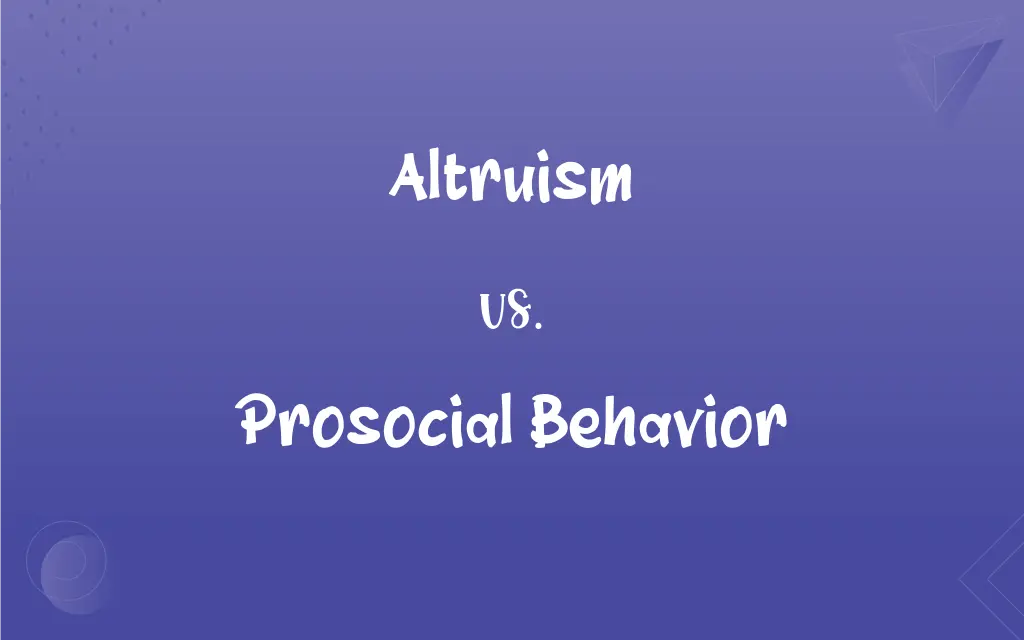Altruism vs. Prosocial Behavior: What's the Difference?
Edited by Janet White || By Harlon Moss || Published on November 21, 2023
Altruism is selfless concern for others' welfare, while prosocial behavior encompasses any positive social actions, including altruism.

Key Differences
Altruism involves actions driven purely by a concern for the well-being of others, without self-benefit, often involving personal sacrifice. Prosocial behavior, while also promoting the welfare of others, may include actions motivated by self-interest, social norms, or expectation of reciprocity.
Altruism is a subset of prosocial behavior, representing its most selfless form. Prosocial behavior includes a broader range of actions like helping, sharing, and comforting, which can be motivated by various factors including altruism, but also self-interest or social expectations.
In altruism, the focus is on the intent behind the action - a genuine desire to benefit others, even at a personal cost. In contrast, prosocial behavior is defined by the nature of the act itself, which is beneficial to others regardless of the underlying motive.
Examples of altruism include donating anonymously to a cause, risking personal safety to help a stranger, etc., where personal gain is not the motive. Prosocial behavior examples include volunteering, charitable donations, or helping a colleague, where motives can vary.
Altruism is often considered more noble due to its selfless nature, while prosocial behavior is broadly encouraged in society for its overall positive impact on social cohesion and mutual support, regardless of the underlying motives.
ADVERTISEMENT
Comparison Chart
Motivation
Selfless, no expectation of personal gain
Can be selfless or motivated by self-interest
Benefit to Self
Often involves personal sacrifice
May include personal benefits like social approval
Nature of Action
Always intended to benefit others
Any action that benefits others
Social Recognition
Often anonymous, not seeking recognition
May seek or receive social recognition
Relationship to Others
Focus on others' needs, often strangers
Can include actions towards known individuals
ADVERTISEMENT
Altruism and Prosocial Behavior Definitions
Altruism
Altruism is the selfless concern for the well-being of others.
He donated a kidney to a stranger, a true act of altruism.
Prosocial Behavior
Prosocial behavior involves actions intended to benefit others.
Sharing his lunch with a classmate was a simple act of prosocial behavior.
Altruism
Altruism is the principle of considering others' needs as a priority.
She worked tirelessly at the homeless shelter, driven by altruism.
Prosocial Behavior
Prosocial behavior encompasses acts of kindness and empathy.
Offering his seat to the elderly woman on the bus was a prosocial behavior.
Altruism
Altruism is acting solely for others' good, without personal gain.
Giving anonymously to charity is an act of pure altruism.
Prosocial Behavior
Prosocial behavior includes helping, sharing, and cooperating.
Her volunteering at the community center is an example of prosocial behavior.
Altruism
Altruism involves sacrificing personal interests for others' benefit.
Her altruism was evident when she gave up her vacation to volunteer in the disaster zone.
Prosocial Behavior
Prosocial behavior is any action that positively affects social relationships.
Complimenting a colleague’s work is a prosocial behavior that fosters a positive work environment.
Altruism
Altruism means helping others even at one's own expense.
He dived into the freezing water to save the child, a remarkable act of altruism.
Prosocial Behavior
Prosocial behavior is positive social conduct that supports a community.
Organizing a neighborhood clean-up is a form of prosocial behavior.
Altruism
Unselfish concern for the welfare of others; selflessness.
Altruism
(Zoology) Instinctive behavior that is detrimental to the individual but favors the survival or spread of that individual's genes, as by benefiting its relatives.
Altruism
Regard for others, both natural and moral without regard for oneself; devotion to the interests of others; brotherly kindness.
Altruism
Action or behaviour that benefits another or others at some cost to the performer.
Altruism
Regard for others, both natural and moral; devotion to the interests of others; brotherly kindness; - opposed to egoism or selfishness.
Altruism
The quality of unselfish concern for the welfare of others
FAQs
What defines prosocial behavior?
Prosocial behavior includes any positive action that benefits others.
Are all altruistic actions prosocial?
Yes, all altruistic actions are prosocial as they benefit others.
Is altruism innate or learned?
The extent to which altruism is innate or learned is debated, but it's likely a combination of both.
Is altruism always selfless?
Yes, true altruism is characterized by selflessness.
What are examples of altruistic behavior?
Donating anonymously or risking personal safety for others are examples.
Do animals exhibit altruism?
Certain animal behaviors, like warning calls, can be considered altruistic.
Is volunteering always altruistic?
Not necessarily; it can be motivated by various factors, not just altruism.
Can prosocial behavior be motivated by self-interest?
Yes, prosocial behavior can be motivated by various factors, including self-interest.
How does prosocial behavior benefit society?
It fosters cooperation, social bonding, and community welfare.
Can altruism be harmful?
Excessive altruism can sometimes lead to neglect of one's own needs.
Are there psychological theories about altruism?
Various theories, like evolutionary psychology, explore the origins and nature of altruism.
What is altruism?
Altruism is selflessly acting for others' welfare, often at a personal cost.
Why is altruism important?
Altruism is crucial for social cohesion and helping those in need.
Can prosocial behavior be a learned habit?
Yes, it can be developed and strengthened over time through practice and socialization.
Can prosocial behavior be taught?
Yes, prosocial behaviors can be encouraged and taught, especially in children.
What's the difference between altruism and kindness?
Altruism is a broader concept, while kindness is an act of being friendly and considerate.
How do altruism and prosocial behavior impact mental health?
Engaging in these behaviors can improve one's mood and sense of social connectedness.
Can prosocial behavior be incentivized?
Yes, through social recognition, rewards, or creating a culture that values such behavior.
How does culture influence prosocial behavior?
Cultural norms and values significantly shape the expression of prosocial behaviors.
How is prosocial behavior related to empathy?
Empathy often motivates prosocial behavior by enabling us to understand others' needs.
About Author
Written by
Harlon MossHarlon is a seasoned quality moderator and accomplished content writer for Difference Wiki. An alumnus of the prestigious University of California, he earned his degree in Computer Science. Leveraging his academic background, Harlon brings a meticulous and informed perspective to his work, ensuring content accuracy and excellence.
Edited by
Janet WhiteJanet White has been an esteemed writer and blogger for Difference Wiki. Holding a Master's degree in Science and Medical Journalism from the prestigious Boston University, she has consistently demonstrated her expertise and passion for her field. When she's not immersed in her work, Janet relishes her time exercising, delving into a good book, and cherishing moments with friends and family.






































































